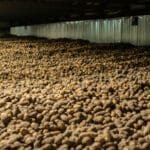The Netherlands
Phytopathologists at Wageningen University in the Netherlands have discovered a new mechanism that increases the resistance of potatoes to Phytophthora infestans, which causes late blight in potatoes. The new kind of resistance is based on the protein LecRK-I.9 and operates on the outside of the plant cell. This is new, because the resistance used so far to help potatoes withstand Phytophthora recognizes unwanted intruders in the plant cell. But this kind of resistance is relatively easy to circumvent because Phytophthora mutates rapidly and can therefore avoid being recognized.
Phytopathologist Klaas Bouwmeester came across LecRK in Arabidopsis, a plant Wageningen scientists often use for research. He demonstrated earlier that this protein plays a role in the resistance of Arabidopsis to plant diseases. Bouwmeester then placed LecRK in potatoes, demonstrating that these potatoes have an increased resistance to Phytophthora, as he explains in the January edition of the Plant Biotechnology Journal.
That does not mean there is now a potato variety with long-lasting resistance to the potato disease, says Bouwmeester. In 2013 he was awarded a grant from the Dutch Organization for Scientific Research to investigate this new kind of resistance further. He is looking for similar proteins in potatoes, as well as in tomatoes and chili peppers. Bouwmeester will examine how these proteins function in order to find the versions that give maximum resistance in these crops.
“If that works, it would be a good idea to combine this new kind of resistance with the familiar resistance proteins in the plant cell,” says Bouwmeester. “In that way, we create two lines of defence against Phytophthora.”
Source: Wageningen University
Turkey
As part of the zero-waste commitment for its manufacturing operation, PepsiCo’s agriculture team in Turkey invested in anaerobic digestion technology several years ago to handle the organic waste created there. Known as a biodigester, the system is fed by a mixture of potato peels, corn kernels and other ingredients used in the company’s snack foods.
Today, the biogas generated by that equipment generates approximately 35 per cent of the electricity needed to run PepsiCo’s two Frito-Lay snack food plants in Turkey. Researchers also figured out a way to turn the nutrient-rich material created in this process into a more environmentally friendly fertilizer, which it is now supplied to its more than 350 contract farmers in the country.
The idea resulted from a collaboration between the manufacturing team, which was trying to find a better way to dispose of the biological waste, and PepsiCo agricultural advisors, who were trying to reduce the negative impact of soil additives used to grow potatoes.
“As the team was thinking about what to do with the sludge, another team was looking for new fertilizer approaches that were more sustainable,” says Ece Aksel, general manager of PepsiCo Turkey. “Together, they found this process.”
The pilot test began roughly two years ago, when the organization began working with prominent scientists to come up with a natural fertilizer formulation beneficial for potato crops. The result is an organic meal that comes in pellet form. To produce the substance, the PepsiCo plants ship the sludge to an external partner, which composts it for about three weeks to dry it out. Next, nutrients are added and the pellets are produced, packed into bags and shipped to farmers.
According to Aksel, this approach helped the plants reduce the operations costs related to the biodigester, and less chemical fertilizer is required for use on farms.That balance was necessary to greenlight the project. “It is imperative that … we ensure that our company is financially successful and environmentally responsible at the same time,” she says.
Source: Greenbiz.com
Kenya
As a contribution to the Consultative Group on International Agricultural Research Humidtropics Research Program, the International Potato Centre (CIP) has a research team in Kenya studying heat-tolerant potato clones. The CIP-Humidtropics research project also works on the training of farmers in western Kenya, where the farm-based trial is taking place.
Started in 2013, the CIP-Humidtropics research focuses on the important issue of crop diversification. In western Kenya, diversification helps to reduce dependence on corn — a principal cash crop in the region — as well as to mitigate the effects of the corn lethal necrosis virus, through the introduction of potato as a rotation crop. As a result of a decline in yields in both corn and beans, Kenyan farmers are now looking for an alternative food crop to supplement what they have.
In response to this demand, CIP is evaluating 16 heat-tolerant potato clones in the western Kenya region to determine which ones are best suited to local conditions. The research team includes scientists and potato breeders from CIP and its partner organization, the Kenya Agricultural Research Institute. Farmers are a key part of the research project, working closely with the research and evaluation team throughout every step of the project.
Source: cipotato.org










